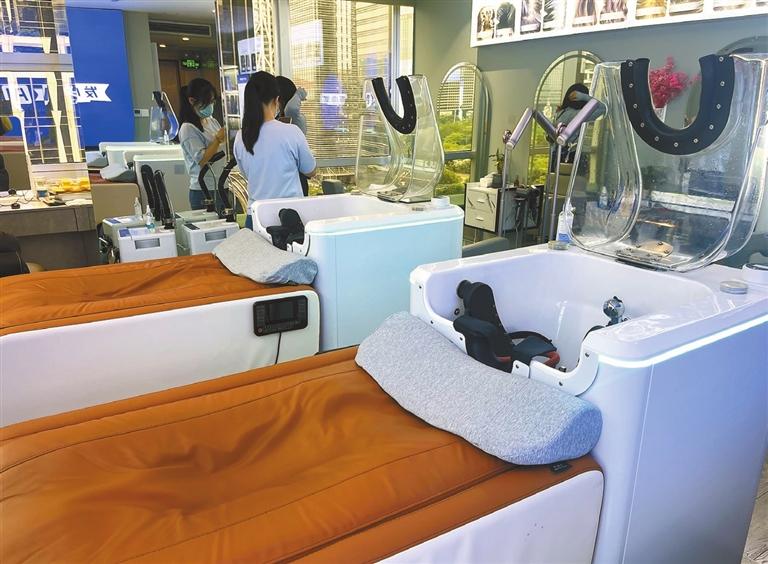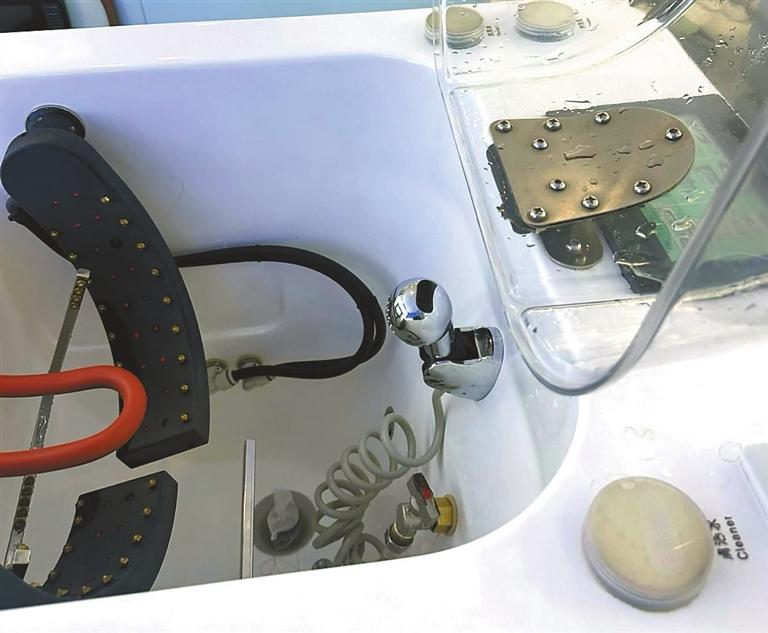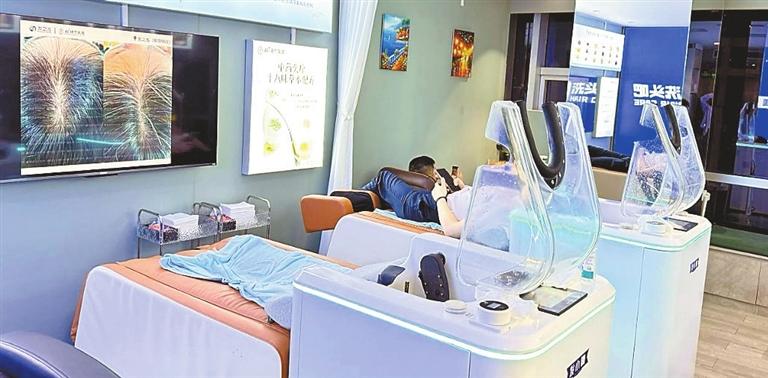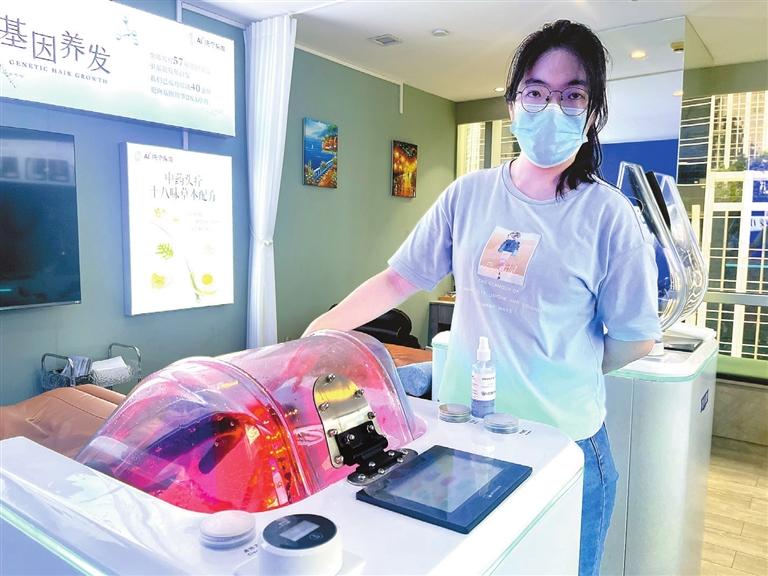



Wei Jie claudiamente@hotmail.com IT was 12:30 p.m. on a Friday, and the elevators in office buildings in the Futian central business district (CBD) were crowded with people on their lunch breaks, as usual. Unlike a typical weekday when she would dine out, 28-year-old Liu Linwei headed straight to the Jinzhonghuan Business Center, located just south of the Greater China International Exchange Plaza on Jintian Road, where her company is based. Her newly discovered “secret lunch break base” is on the ninth floor of the Jinzhonghuan building. The moment she laid down on an automated hair-washing machine, two robotic arms started massaging her scalp with water at varying intensities, which she could adjust to her comfort. Shortly afterward, she received a scalp test report on her mobile phone. “It feels just as comfortable as having my hair washed manually at a traditional salon, yet it saves a lot of time,” said Liu. Emergence of AI hair-washing stores This scene has been staged at various locations throughout Shenzhen, particularly in Futian, Nanshan, Luohu, Longhua, and Bao’an districts, since last year. According to Chinese-language media reports from mid-April, the city currently has more than 500 such AI-powered hair-washing stores, with the highest daily average customer count reaching 62. The AI-powered hair-washing store that Liu frequents opened in September 2024 and features two such machines. The store averages about 50 customers per day, said the store manager, who identified himself only by his family name Zhang. According to Zhang, store staff will conduct a professional scalp health test with equipment for each customer prior to the hair wash. Based on the test results, the AI-powered machine automatically selects the appropriate treatment mode — dry or oily scalp — for each customer. The hair-washing device is disinfected after each use, and disposable towels and earplugs are provided, said Zhang, adding that those interested should make a reservation through the store’s WeChat mini-program to secure their preferred half-hour service time slot before visiting. Efficient and affordable After customers lie down on the specially designed machine, which is equipped with massage functions, and choose the washing mode according to the length of their hair, they are asked about their preferred water temperature and washing intensity. The automated hair-washing machine offers three levels of intensity: low, medium, and high. During the hair wash, water jets clean the hair by varying the position and water flow while automatically dispensing shampoo and conditioner. The entire treatment process includes two shampoo cycles, one conditioning cycle, and a final rinse. In addition, the machine features a red light therapy function. The standard process for the long hair mode takes about 15 minutes. After washing, customers can dry their hair using the available options. Currently, the AI hair-washing service costs about 19 yuan (US$2.60) per session, with some online service platforms offering discounts as low as 9.9 yuan. After the machine wash, Liu said that the wash felt “very clean” and the water intensity was stronger than traditional washing methods. “I can feel the water flow mimicking a person massaging. I will definitely come back regularly.” Zhang explained that because the machine uses a direct water flow, the water pressure during washing is stronger than that of traditional manual washing. “That’s precisely why the machine is able to provide a deep cleaning of the customer’s scalp,” he said. Shenzhen-made device The AI-powered hair-washing machine was developed by Shenzhen EAIN Technology Co. Ltd., a high-tech company based in Bao’an District that has focused on producing cloud-based, intelligent, health-related robotic machines since its founding in 2018. The machine features a dual robotic arm design equipped with more than 10 water nozzles to provide a personalized scalp cleansing experience. Users can easily customize key settings such as hair length and washing intensity through a touchscreen interface. After a user lies down on the machine, the robotic arms take over to complete the washing, according to an introduction by Shenzhen EAIN. Infrared sensors adjust the water spray angle in real time to improve coverage and comfort. Hygiene and safety are top concerns for consumers. To address these issues, the developer has incorporated a dual-mode sterilization system that combines ultraviolet light and high-temperature treatment. A sterilization cycle takes just two minutes, ensuring that the device remains sanitary between uses. Wu Wenying, marketing director of EAIN, pointing out a standout feature of the next-generation device, said that its real-time monitoring system employs 128 sensor groups to track the scalp’s micro-environment. This data feeds into a cloud-based algorithm paired with a super-pressurized water circulation system, aiming to enhance washing effectiveness. The AI-powered hair-washing machines have experienced rapid expansion beyond Shenzhen, appearing in other cities like Guangzhou, Guangdong Province, and Fuzhou in Fujian Province. They are typically found in hair care and scalp treatment salons or beauty and body care centers. Some can be found in independently operated pop-up experience shops. Reshaping hairdressing industry? This novel hair-washing experience has attracted a large number of young consumers. Chen Hao, store manager of an AI hair-washing experience store in Bao’an District, said data from his store shows that 79% of consumers are between 20 and 35 years old. Will this emerging smart device reshape the traditional hairdressing industry? A traditional hair salon in Shenzhen Hi-Tech Industrial Park, Nanshan District, reported a significant reduction in labor costs after introducing an AI-empowered washing machine. The store manager, who preferred to remain anonymous, said that his hair care team was cut in half. “The one-time investment of 30,000 yuan in a device helps us save tens of thousands of yuan each month in labor expenses.” A traditional salon in Shenzhen generally charges 68 yuan for a basic hair wash, while the AI hair-washing stores offer memberships with rates of 19 yuan per session and early-bird prices as low as 9.9 yuan. The price gap has diverted a significant portion of the customer base, especially young consumers, acknowledged the manager of a traditional hair salon in Luohu District, who gave only his family name Zhang. Earlier media reports said that some traditional hair salons in Tianhe District, Guangzhou, have been forced to launch “midday special wash and care packages” in response to the low prices of the AI hair-washing stores, resulting in compressed profit margins. Traditional barbershops need several weeks to train skilled hair washers, whereas the AI hair-washing machines require only one or two staff members who can be fully competent in maintaining the device after just three days of training. Mr. Liu, a hairdressing industry practitioner in Luohu District, said he believes that the automated hair-washing equipment can help address the shortage of staff during peak hours in traditional salons, but that it may also replace some positions within the industry. However, some other traditional hair salons view the technology differently and embrace its emergence. “I don’t see it as replacing barbers, but rather freeing them from repetitive labor and allowing them more time for more valuable services,” said Chen of the Bao’an store. Meanwhile, Wang Dong, who has worked in the city’s hairdressing industry for many years, said that the impact of AI hair-washing stores on barber shops may be limited. “[The AI hair-washing stores] focus on hair care treatments, while we focus on haircuts and styling — each has its own strengths,” he said. “Now I can focus on designing hairstyles for my clients,” said a stylist surnamed Zhao at a hair salon franchise in Futian District. The hair salon has also introduced the AI hair-washing machines to manage basic customer flow. AI solves the problem of standardization, but a barber’s creativity can never be coded, and this is the strongest competitive advantage in the service industry, Wang added. | 
